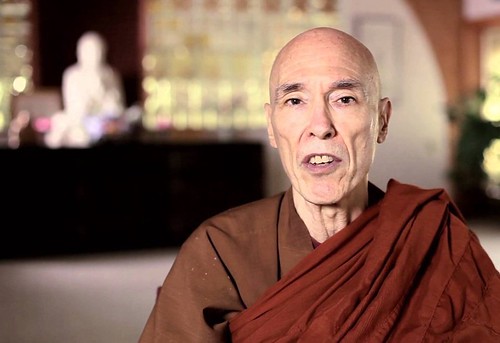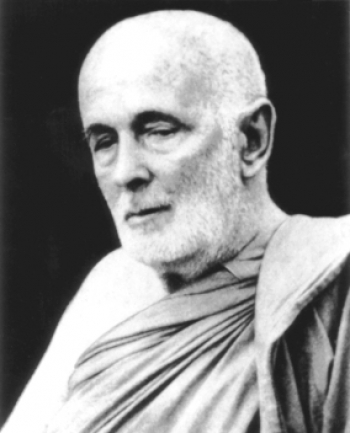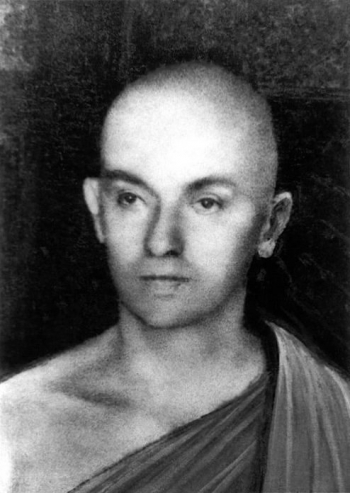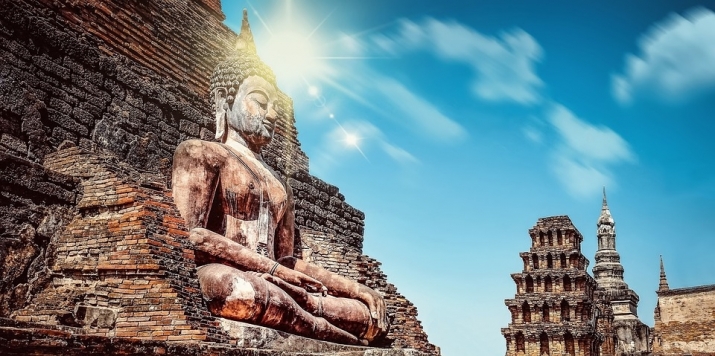Baby Steps on the Path of Purity
By David Dale Holmes
Buddhistdoor Global
| 2017-02-17 | I visited Venerable Nyanaponika Thera at the Forest Hermitage, in Kandy, Sri Lanka, in the mid-1980s, when Bhikkhu Bodhi was still staying there with him, and I asked them: “What is the heart of Theravada Buddhism?” Ven. Nyanaponika answered: “Why look anywhere but in the words of the Buddha?” And he told me to read The Word of the Buddha by his teacher, Ven. Nyanatiloka. Bhikkhu Bodhi wrote down the title so that I wouldn't forget it. I remember being quietly awed by the loving-kindness they showed me, and I have never forgotten what I learned from following their instructions.
Ven. Nyanitoloka's The Word of the Buddha explains the process of how one may become free from suffering and attain nibbana, beginning with the initial step on the Noble Eightfold Path—called right understanding—which means knowing how to free the mind from wrong views and attitudes that block right view:
It is knowing what is a good action and what is a bad action.
It is knowing the difference between right and wrong.
Right Understanding is knowing what is a wholesome action and what is an unwholesome action.
It means knowing what is morally good and why—in the same way that one knows and understands that it is right to care, to give, to love, and to feel compassion.
Right understanding leads to willing the good, through the actions of body, speech, and mind. The mind’s willing an action is called kamma or “volition”—a mental force seeking to actualize the mind’s will. Kamma is an action of the will that results in something wholesome or unwholesome arising. (Bodhi 1984)

Bhikkhu Bodhi. From mygodpictures.com
An action of the mind is unwholesome when it is harmful or blameworthy, when it can be hurtful to something or someone, when it can cause suffering for oneself or others, when it hinders the spiritual development (bhavana) of oneself or others. In short, unwholesome kamma does harm and should be avoided.
The Buddha said we should avoid unwholesome kamma by not committing the following harmful actions:
Body:
1. Destroying life
2. Taking what is not given
3. Wrong sexual conduct
Speech:
4. False speech
5. Slanderous speech
6. Harsh speech
7. Idle chatter
Mind:
8. Covetousness
9. Ill will
10. Wrong views
Unwholesome kamma must be grasped and extinguished at its root before it has a chance to take hold and grow. One who has wholesome motives rather than unwholesome motives will be on the path of right understanding.
Greed, aversion, and delusion are particular enemies of wholesome kamma and must be resisted whenever they arise in the mind. The secret lies in turning away from negative kamma and willing the contrary. It means abstinence, self-control, and mind-control. This necessitates intensive training based on denying what is not good for one or for one’s spiritual development (bhavana) and replacing it with its opposite.
Right understanding leads to meritorious action, which leads to accrued merit, which opens the way to a deepening in understanding of the nature and the causes of suffering, its cessation, and nibbana.
 Mahathera Nyanatiloka. From zugangzureinsicht.org
Mahathera Nyanatiloka. From zugangzureinsicht.orgWrong understanding leads to wrong views, wrong motives, wrong actions, increasingly bad kamma and more suffering. Right understanding of the effect of bad kamma is enough to make one want to avoid doing such actions as one sees how delusion keeps leading to more harmfulness. One is the owner of the kamma one makes. This means one reaps the fruit of one’s actions, either in this life or in the next. (Ledi Sayadaw 1977)
The second step on the Noble Eightfold Path is called right thought, although a more effective translation might be right intention. The Buddha explains that right intentions are threefold: intention of renunciation; intention of good will; and intention of harmlessness. These three right intentions are the opposite of the wrong intentions of desire, ill will, and harmfulness. As thought is the forerunner of action, right thought is the forerunner of right actions, and wrong thought is the forerunner of wrong actions.
The Buddha relates (Majjhima Nikaya 19) that while meditating prior to enlightenment, he found his thoughts could be divided into two opposite classes. Whenever he noticed thoughts of desire, ill will, and harmfulness arising, he replaced them with thoughts of renunciation, good will, and harmlessness. He understood that the former kind of thoughts lead to harmfulness for oneself and others, and obstructed the path to wisdom. Hence, he developed the wisdom to eliminate the obstructions and open the path.
Merely knowing what is a right action, however, is not yet enough. One has to know what is right and then actually do it. Ven. Ledi Sayadaw writes: “All one’s book learning will not change harmfulness into loving kindness.” Only actual practice can bring this about. “This means hard work on oneself which may be painful emotionally, but then the result of accomplishing just a little here is that one becomes a ‘solid’ Buddhist.” (Ledi Sayadaw 44, 1977)
The Buddha saw duality in nature. He realized how everything could be replaced by its opposite; that intentions of good will and harmlessness offer the antidote to aversion, ill will, and suffering. He saw how thoughts of anger, hostility, and resentfulness lead to cruelty, aggression, and destruction, and he saw that replacing the intentions of harmfulness with the intentions of harmlessness open the path to wisdom. (Bodhi 33, 1984)
 Bhikkhu Nanamoli. Image courtesy of the author
Bhikkhu Nanamoli. Image courtesy of the authorThe Buddha said that his teachings went contrary to the desirous way of the world, which seeks happiness in objects of desire, imagining that the attainment of such objects will bring happiness and fulfillment. The Buddha flows against the stream, breaking free from craving and finding happiness in a lack of desire. The Buddha saw that unfulfilled desire is the root of unhappiness and dissatisfaction, and the way to be free of such suffering is to get rid of desire, to pull out the root of unwholesome craving through renunciation.
We have to break the mind of its habit of grasping and teach it to let go. If we examine the root of desire and see the unhappiness it leads to, we may learn to resist and abandon desire. If we learn that freedom from the hold of attachment is the key to happiness, then, step by step, one by one, we should be able to bring unwholesome desires under control and rise above the unwholesome level of worldly bondage and suffering.
While our initial baby steps in bhavana may be unsure, unsteady, and unskillful, if we continue practicing with ardency and with diligence, we will be able to find firm footing following the path of purity.
Professor David Dale Holmes taught English and World Literature and Creative Writing for the University of Maryland, Munich Campus, European Division, from 1966–92, after which he moved to Asia to lecture at Thailand’s Chulalongkorn University, and later at the World Buddhist University in Bangkok. From 1986–92, he traveled yearly between Munich, Germany, and Kandy, Sri Lanka, to study under Venerable Nyanaponika and Venerable Bhikkhu Bodhi. Here he became familiar with the body of literature disseminated by the Buddhist Publication Society, and later assisted in editing the BPS Wheel Series to make it available online for free download.
References
Bodhi, Bhikkhu. 1984. The Noble Eightfold Path. Kandy: Buddhist Publication Society.
Ledi Sayadaw. 1977. The Noble Eightfold Path and its Factors Explained. Kandy: Buddhist Publication Society.
Nanamoli, Bhikkhu. 1975. The Path of Purification (Visuddhi Magga). Kandy: Buddhist Publication Society.
Narada, Mahathera. 1980. The Buddha and His Teachings. Kandy: Buddhist Publication Society.
Nyanaponika, Mahathera. 1982. The Road to Inner Freedom. Kandy: Buddhist Publication Society.
Nyanatiloka, Mahathera. 1967. The Word of the Buddha. Kandy: Buddhist Publication Society.
All of these books are available for download free of charge.



















